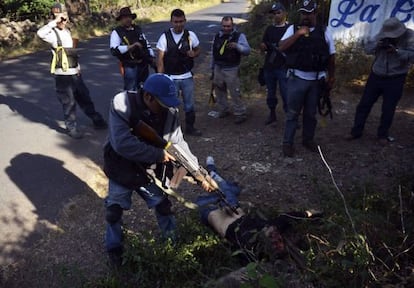Mexican government begins process of legalizing vigilante groups
Self-defense forces will be allowed to take part in rural security operations


Representatives of Michoacán self-defense forces and Mexican authorities late Monday signed an agreement that would allow the vigilantes to eventually incorporate themselves in “public life.”
The document was hammered out just two weeks after Mexican President Enrique Peña Nieto sent in troops to the southwestern state to quell the violence that erupted when citizens took up arms to battle the powerful Los Caballeros Templarios (Knights Templar) drug cartel that had been terrorizing the region.
The signing of the agreement also came on the day when Mexico’s federal government announced the arrest of one of the cartel’s leaders, Dionisio Loya Plancarte, known as “El Tío” (the uncle).
According to the agreement, self-defense forces will help provide security in rural areas but also register their weapons and will have to follow police force requirements.
On February 24, 2013, the residents of the agricultural region known as Tierra Caliente decided to take up arms against cartel members after they grew tired of extortions, kidnappings and other abuses. The Templarios, which is a spin-off group from the Michoacán Family cartel, have been operating in the area since 2011.
One of the leaders of the vigilantes, José Manuel Mireles, accused the Templarios of kidnapping and raping the daughters of local ranchers.
After the self-defense forces moved into nearly two dozen municipalities, they removed local authorities and police. But when they tried to penetrate further into areas controlled by the cartel, violent clashes began which forced the central government to take action by sending troops and federal police into Michoacán earlier this month.
“The agreement is the first step, but there is still much to be done to come up with a strategy for security and development in Michoacán,” said Michoacán state security chief Alfredo Castillo, who added that the accord will allow “a progressive return” to normalcy in the area.
But the agreement does not automatically include all the vigilante groups that have taken up arms; each community will sign the agreement separately, government officials said.
Tu suscripción se está usando en otro dispositivo
¿Quieres añadir otro usuario a tu suscripción?
Si continúas leyendo en este dispositivo, no se podrá leer en el otro.
FlechaTu suscripción se está usando en otro dispositivo y solo puedes acceder a EL PAÍS desde un dispositivo a la vez.
Si quieres compartir tu cuenta, cambia tu suscripción a la modalidad Premium, así podrás añadir otro usuario. Cada uno accederá con su propia cuenta de email, lo que os permitirá personalizar vuestra experiencia en EL PAÍS.
¿Tienes una suscripción de empresa? Accede aquí para contratar más cuentas.
En el caso de no saber quién está usando tu cuenta, te recomendamos cambiar tu contraseña aquí.
Si decides continuar compartiendo tu cuenta, este mensaje se mostrará en tu dispositivo y en el de la otra persona que está usando tu cuenta de forma indefinida, afectando a tu experiencia de lectura. Puedes consultar aquí los términos y condiciones de la suscripción digital.








































